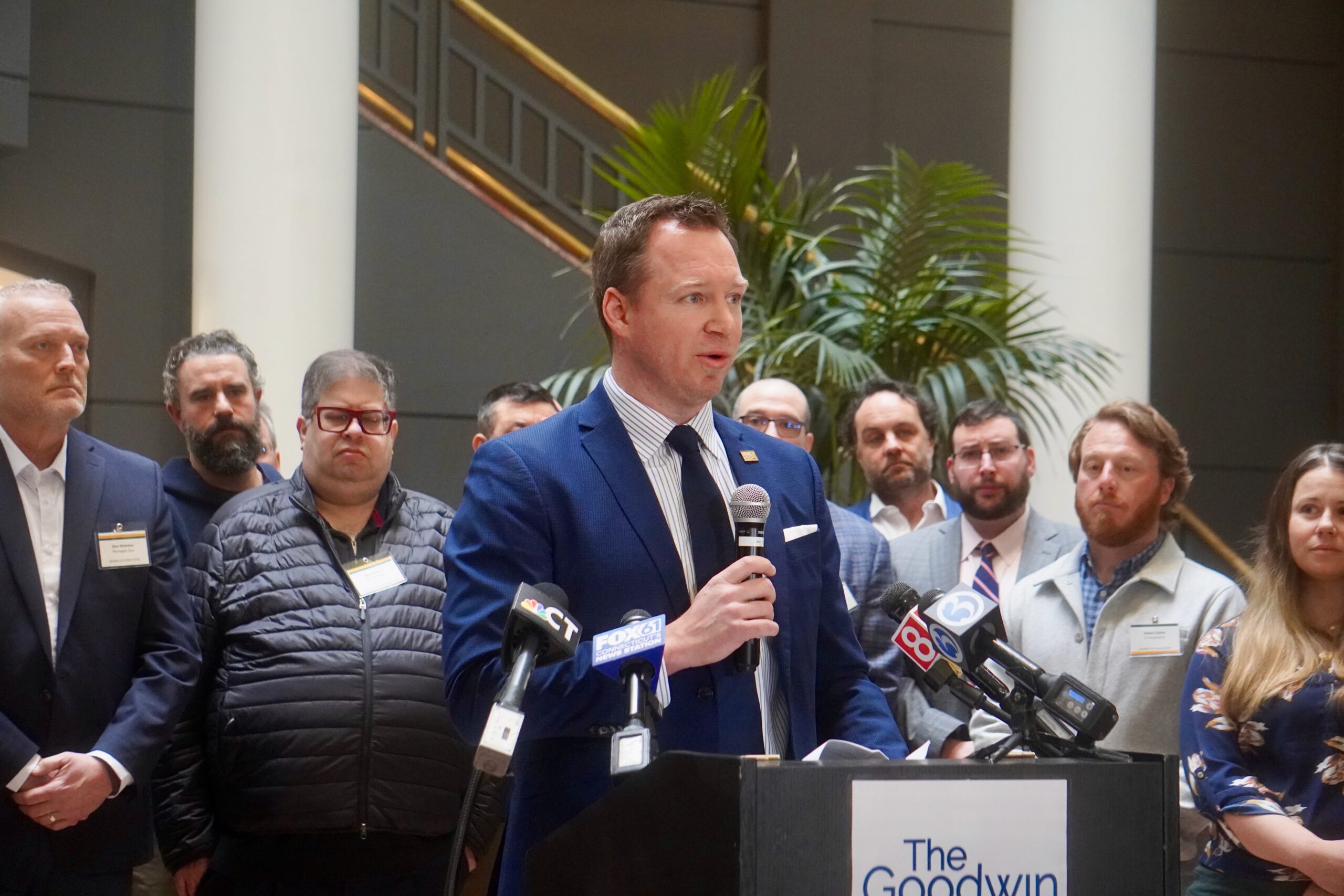Lamont Signs Cannabis Legalization Bill Into Law

Audio By Carbonatix

Gov. Ned Lamont signs legislation legalizing recreational cannabis for adults. Photo credit: Hugh McQuaid, CTNewsJunkie.com
Retail sales won’t begin right away, but possession of certain quantities of marijuana by people ages 21 and up is permitted as of July 1, and communities with more than 50,000 residents – which includes West Hartford – will be required to designate a location where cannabis consumption is allowed.
By Hugh McQuaid, CTNewsJunkie.com
Connecticut became the 19th state to legalize recreational cannabis for adults Tuesday as Gov. Ned Lamont signed the bill, flanked by lawmakers during a ceremony at the state Capitol building.
“It is a model for the rest of the nation,” Lamont said. “We’ve had a chance to learn from others and I think we’ve got it right here in the state of Connecticut. Maybe we weren’t the first, but we were the first, I think, to show that we can get it right.”
Elements of the bill will go into effect as soon as next week. As of July 1, people at least 21 years old can legally possess the long-prohibited substance. Residents will be allowed to carry up to 1.5 ounces. As much as 5 ounces can be secured at home or in the trunk or glove box of a vehicle. Starting next week, the smell of cannabis is no longer considered cause for police to search a vehicle and the presence of THC no longer constitutes a failed drug test.
“The idea is you didn’t want to turn, say, the New Haven green into just a smoking free-for-all,” Rep. Mike D’Agostino, co-chair of the General Law Committee, said. “So you’ll have a dedicated area for public consumption.”
Other provisions of the new law will take shape over time. The bill establishes a framework for the regulation and sale of the substance. Commercial retail sales are allowed by the end of next year, although most proponents believe it may take awhile before retail cannabis locations appear.
Meanwhile, a provision automatically erasing criminal records of some cannabis-related crimes will be effective as of 2023. It will be about two years before most residents will be legally allowed to grow cannabis plants in their homes. Beginning in July 2023, residents can grow up to six cannabis plants – three mature and three immature – at their residences.
The bill expands, as of Oct. 1, areas where smoking cannabis, cigarettes, or vaping is prohibited. It means that people who vape or smoke tobacco-based products will be prohibited from smoking 25 feet outside a restaurant or public building.
The law will also create a social equity council to help ensure that Connecticut’s legalization of cannabis effectively improves the communities that have been most damaged by the war on drugs. The bill requires that half of cannabis business licenses go to applicants from areas with high rates of poverty, drug convictions, and unemployment.
Sen. Gary Winfield, a New Haven Democrat who is co-chair of the Judiciary Committee, said that war has historically targeted certain communities.

Sen. Gary Winfield. Photo credit: Hugh McQuaid, CTNewsJunkie.com
“We’ve existed under a legal scheme where we have laws that are just not just,” Winfield said. “I think what the state of Connecticut did by focusing on that … is to deal with the issues of the past.”
The 15-member social equity council within the Economic and Community Development Department is designed to encourage participation in the industry from people in communities harmed by the prohibition of cannabis. The governor and legislative leaders will make appointments to the committee. The bill calls for those appointments to be made within the next 45 days.
“I’ve already begun the conversation in my office about how we’re going to identify the most qualified people to serve on the equity council,” House Majority leader Jason Rojas said.
Cannabis legalization is an issue which lawmakers have considered for years. In the past, it has never been called for a vote in either chamber of the legislature.
Rep. Steve Stafstrom, a Bridgeport Democrat who is co-chair of the Judiciary Committee, called the state’s prior reluctance to legalize the substance a “blight spot” on Connecticut’s record of leading on criminal justice reform. He said it was fitting that the governor signed it after a session in which the legislature passed several high-profile criminal justice policies.
“As we sit here and talk about a historical session, certainly in a number of respects – not the least of which was on criminal justice reform issues – that at the top of that list is finally getting legalization done and finally making sure we join that group of states that recognizes this is a drug that can be and should be safely regulated,” he said.
In a statement, House Minority Leader Vincent Candelora said the decision to legalize cannabis was a bad policy decision for the state.
“And I’m disappointed, but not altogether surprised, that during the Democrats’ gleeful remarks about this ‘momentous’ decision to legalize and commercialize a drug, the Governor offered the contradictory view that their legislation prioritizes public health and safety,” Candelora said. “For Democrats, public health was never a primary concern – it’s been about their bizarre view of economic development and creating a revenue source that, unfortunately, won’t even be used to balance our state budget.”
Republished with permission from CTNewsJunkie.com, all rights reserved.
Like what you see here? Click here to subscribe to We-Ha’s newsletter so you’ll always be in the know about what’s happening in West Hartford! Click the blue button below to become a supporter of We-Ha.com and our efforts to continue producing quality journalism.



